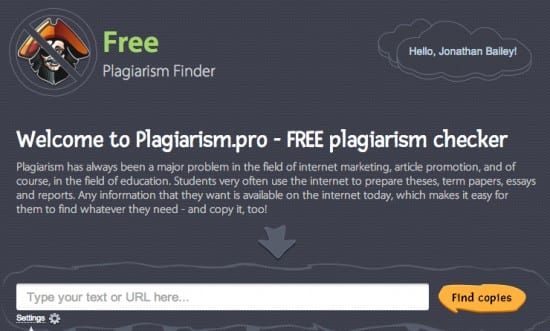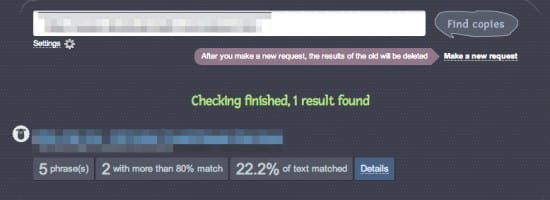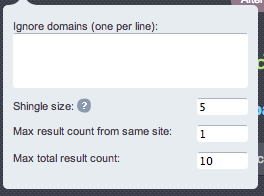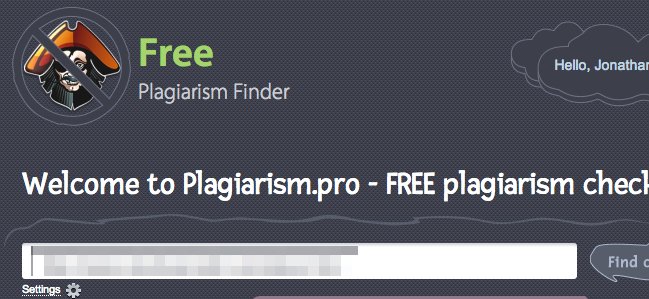Review: Plagiarism.Pro Falls Short
 I receive regular requests to review new plagiarism and copyright infringement detection tools. Most, however, fail to impress me enough to consider them for a review.
I receive regular requests to review new plagiarism and copyright infringement detection tools. Most, however, fail to impress me enough to consider them for a review.
However, Plagiarism.Pro caught my eye with a new feature rarely seen in a Copyscape or PlagSpotter-style plagiarism checker: The ability to customize your search parameters so that you can ignore domains, set your match string length (called “Shingles” in Plagiarism.Pro and set the maximum number of results from one domain.
These features are typically reserved for ultra-precise offline checkers such as WCopyFind and aren’t even available on most professional-grade plagiarism checkers that search the Internet broadly.
If Plagiarism.Pro could execute those features and make their site work well it could be a coup for those wanting to find copies of their work online. However, after testing the service, it simply didn’t hold up. The match results were too slow, too few and the match information was not adequate to help spot and deal with plagiarism.
So while Plagiarism.Pro has an interesting idea, the execution leaves a lot to be desired and, at the time, doesn’t appear to be a major threat to the reigning leaders in the field.
The Basics of Plagiarism.Pro
When you first visit Plagiarism.Pro, it looks similar in nature to Copyscape, PlagSpotter or similar plagiarism-detection tools.

The overall design is attractive, if a bit basic, and it functions well enough (though it’s awkward to paste text in a one-row text box). From there, you either simply paste the URL or the text that you want to look for for, hit search and, after spinning for a period of time, it produces the results.

As mentioned above, you do have the option so changing your search settings. You can ignore domains, set your shingle (string) size, set the maximum number of results to receive from one site and also set a limit on the total results (See Image Below).
All in all, Plagiarism.Pro appears, at first glance, to be a simple but potentially powerful plagiarism checker. However, that appearance fell apart once I started putting it to the test.
Testing Plagiarism.Pro
 To test Plagiarism.Pro, I simply performed a search for three URLs of a client website to see how well it performed against Copyscape and PloagSpotter.
To test Plagiarism.Pro, I simply performed a search for three URLs of a client website to see how well it performed against Copyscape and PloagSpotter.
The first thing I noticed was that the search took a long time on Plagiarism.Pro, longer than even the slowest result on PlagSpotter. In fact, of the three tests that I did, none took less than 30 seconds and one, for a very long work, took 3 minutes and 9 seconds.
Though Plagiarism.Pro does provide a cute animation to let you know it’s working, after three minutes, it’s easy to believe the site is broken.
However, the real problem is that the results in Plagiarism.Pro were simply not adequate. I ran three tests and the results were not even close.
[table id=4 /]Normally I test with at least 10 different pages of varying content types but, after three marketing copy tests, I called it quits. In every test, save one where PlagSpotter seems to have had a problem, Plagiarism.Pro was not just in last place, but in last place by a wide margin.
To make matters worse the results were more or less useless. There was no text highlighted version and, instead, it only provided a list of matching strings. This made it difficult to see just how serious the alleged plagiarism is and even harder to point it out to a DMCA agent or attorney.
In short, Plagiarism.Pro is far slower, provides far fewer results and does so in a way that is far more difficult to make use of.
As for the new settings, they didn’t seem to make any difference. Changing shingle length had no appreciable impact on results and, no matter what I did, I could never get more than two results for any page.
In short, it’s a decent idea for a plagiarism detection service, but it’s so poorly executed that there is no reason to use it at this time.
Bottom Line
When it comes to plagiarism detection, and any other industry, competition is a good thing. However, right now, Plagiarism.Pro isn’t providing much in the way of competition. One is clearly better off with either Copyscape or PlagSpotter.
While I’m glad to see that Plagiarism.Pro did attempt at least something somewhat new, the system feels like an early alpha and I wonder if the request for a review was a bit premature on their part.
Still, if they are able to improve the service and make it more competitive. I’ll be happy to do a re-review in the future.
In the meantime, it’s another service that’s best to avoid.
Want to Reuse or Republish this Content?
If you want to feature this article in your site, classroom or elsewhere, just let us know! We usually grant permission within 24 hours.
